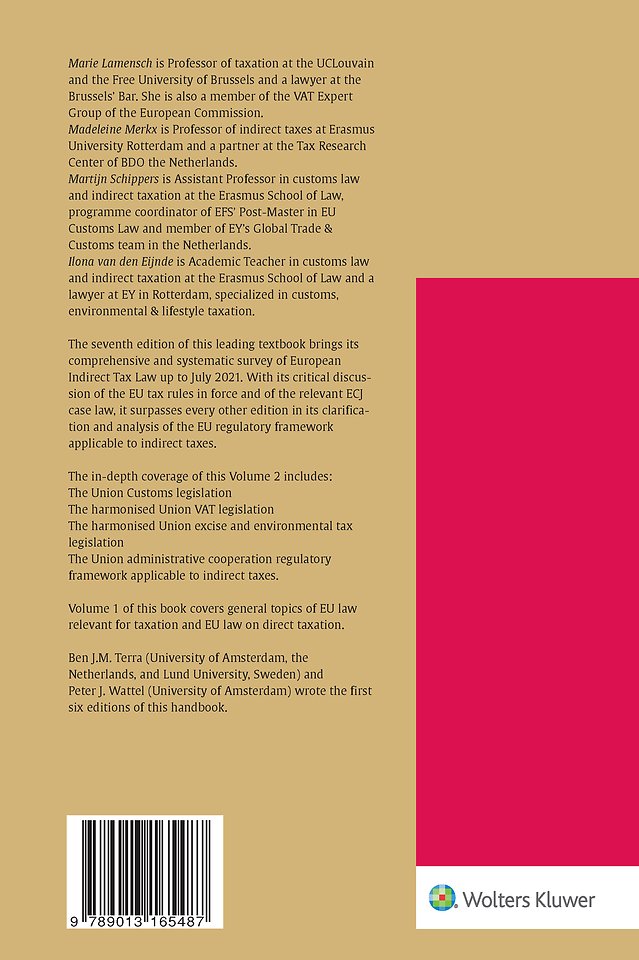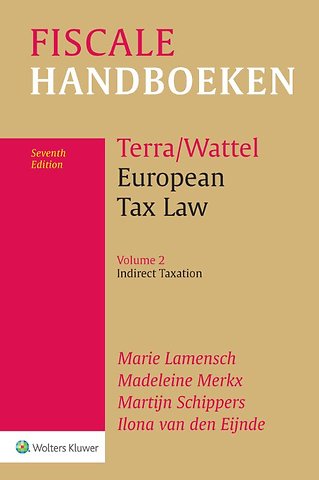European Tax Law - Volume 2 Indirect Taxation
Gebonden Nederlands 2022 7e druk 9789013165487Samenvatting
The Seventh edition of this leading textbook brings its comprehensive and systematic survey of European Indirect Tax Law up to July 2021. With its critical discussion of the EU tax rules in force and of the relevant ECJ case law, it surpasses every other edition in its clarification and analysis of the EU regulatory framework applicable to indirect taxes.
The in-depth coverage of this Volume 2 includes:
The Union Customs legislation
The harmonised Union VAT legislation
The harmonised Union excise and environmental tax legislation
The Union administrative cooperation regulatory framework applicable to indirect taxes
Volume I of this book covers general topics of EU law relevant for taxation and EU law on direct taxation.
Ben J.M. Terra (University of Amsterdam, the Netherlands, and Lund University, Sweden) and Peter J .Wattel (University of Amsterdam) wrote the first six editions of this handbook.
Trefwoorden
Specificaties
Lezersrecensies
Inhoudsopgave
U kunt van deze inhoudsopgave een PDF downloaden
Introduction 1
Chapter 1 The Union Customs Code Update and elaboration by Martijn Schippers 3
1.1 Introduction 3
1.2 Legal sources 4
1.2.1 The international legal (customs) framework 4
1.2.2 The EU Customs Union 5
1.3 General Provisions (Titles I and IX) 7
1.3.1 The General Provisions of Title I 7
1.3.1.1 Scope of the customs legislation, mission of customs authorities and definitions 7
1.3.1.2 Rights and obligations of persons with regard to the customs legislation 9
1.3.1.3 Representation 9
1.3.1.4 Binding Tariff Information 10
1.3.1.5 Authorized Economic Operator 12
1.3.1.6 The Right to Appeal 13
1.3.2 Final Provisions 15
1.4 Methods of Levying Duties (Titles II and III) 16
1.4.1 Customs Debt and Guarantees 16
1.4.1.1 The incurrence and debtors of a customs debt 16
1.4.1.2 Repayment/Remission 22
1.4.1.3 The extinguishment of a customs debt 26
1.4.2 Factors on the basis of which import duties are applied 27
1.4.2.1 The Customs Tariff 27
1.4.2.2 Origin 33
1.4.2.3 The Customs Value 36
1.5 The System of Formalities and Supervision (Titles IV, V, VI, VII and VIII) 48
1.5.1 Entry of Goods (Title IV) 49
1.5.1.1 The Entry Summary Declaration 49
1.5.1.2 Arrival of the Goods 49
1.5.1.3 Presentation, Unloading and Examination of the Goods 50
1.5.1.4 Temporary Storage of Goods 50
1.5.2 Customs Status, Customs Procedure, Verification, Release and Disposal of Goods (Title V) 52
1.5.2.1 Customs status of goods 52
1.5.2.2 Placing goods under a customs procedure 52
1.5.2.3 Verification and release of goods 56
1.5.2.4 Disposal of goods 56
1.5.3 Release for Free Circulation (Title VI) 56
1.5.4 Special Procedure (Title VII) 58
1.5.4.1 Import duties due by default, suspension by exception 58
1.5.4.2 Transit 61
1.5.4.3 Storage (Customs Warehousing and Free Zones) 66
1.5.4.4 Specific use 67
1.5.4.5 Processing 68
1.5.5 Export and re-export (Title VIII) 70
Chapter 2 Value Added Tax – the Recast VAT Directive Update and elaboration by Marie Lamensch and Madeleine Merkx 73
2.1 Introduction 73
2.2 Subject Matter 74
2.3 Scope 77
2.4 Territorial Application 78
2.5 Taxable Persons 79
2.5.1 Introduction 79
2.5.2 Any person 80
2.5.3 Economic activity 80
2.5.4 Continuing basis 83
2.5.5 Independence 83
2.5.6 Holding companies and share dealings 85
2.5.7 Public bodies 85
2.6 Taxable Transactions 86
2.6.1 Supply of goods 87
2.6.2 Intra-Community supplies 92
2.6.3 Supply of services 93
2.6.4 Importation of goods 96
2.6.5 Vouchers – provisions common to supply of good and service 97
2.6.6 New Means of Transport 97
2.7 Place of Taxable Transactions 98
2.7.1 Place of Supply of Goods 99
2.7.2 Place of Intra-Community Acquisition of Goods 101
2.7.3 Place of Supply of Services 104
2.7.4 Place of Importation 114
2.8 Chargeable Event and Chargeability of Tax 115
2.8.1 Goods and services 115
2.8.2 Intra-community acquisitions 118
2.8.3 Imports 119
2.9 Taxable Amount 119
2.10 Rates 124
2.11 Exemptions 127
2.11.1 Exemptions without the Right to Deduction 127
2.11.2 Exemptions Relating to Intra-Community Transactions 142
2.11.3 Exemptions on Importation 144
2.11.4 Exemptions on Exportation 145
2.11.5 Exemptions Related to International Transport 146
2.11.6 Exemptions Relating to Certain Transactions Treated as Exports 147
2.11.7 Exemptions for the Supply of Services by Intermediaries 147
2.11.8 Exemptions for Transactions Relating to International Trade 147
2.12 Deductions 150
2.12.1 Preliminary remarks 150
2.12.2 Origin and Scope of Right of Deduction 153
2.12.3 Refunds 158
2.12.4 Proportional Deduction 160
2.12.5 Rules Governing the Exercise of the Right of Deduction 166
2.12.6 Adjustment of Deductions 169
2.12.7 Private Use 171
2.12.8 Deductions and Shares and Dividends 173
2.12.9 Fraud and abusive practices 182
2.12.9.1 Fraud 182
2.12.9.2 Abusive practices 184
2.13 Obligations of Taxable Persons and Certain Non-Taxable Persons 187
2.13.1 Obligation to Pay 187
2.13.2 Identification 193
2.13.3 Invoicing 193
2.13.4 Accounting 204
2.13.5 Returns 205
2.13.6 Recapitulative Statements 206
2.13.7 Other Provisions 207
2.13.8 Obligations in Respect of Imports 207
2.14 Special Schemes 208
2.14.1 Small and Medium-Sized Enterprises 208
2.14.2 Farmers 209
2.14.3 Travel Agents 210
2.14.4 Second-Hand Goods, Works of Art, Collectors’ Items and Antiques 211
2.14.5 Investment Gold 212
2.14.6 Special schemes for reporting and remitting VAT by non-established businesses 212
2.14.6.1 Introduction 212
2.14.6.2 Non-Union scheme 213
2.14.6.3 The Union scheme 214
2.14.6.4 Import One Stop Shop (I-OSS) 215
2.14.6.5 The special arrangement for declaration and payment of import VAT 216
2.15 Derogations 217
2.15.1 Derogations Applying until the Adoption of Definitive Arrangements 217
2.15.2 Derogations Subject to Authorisation 219
2.16 Miscellaneous 219
2.16.1 Implementing Measures 220
2.16.2 VAT Committee 232
2.16.3 Conversion Rates 235
2.16.4 Taxes Not to Be Characterised as Turnover Taxes 236
2.17 Final Provisions 236
2.17.1 Transitional Arrangements and Transitional Measures 237
2.17.2 Transposition and Entry into Force 239
2.18 Final words on the ECJ case law 239
Chapter 3 Excises and Energy Taxation Update and elaboration by Ilona Van Den Eijnde 243
3.1 Introduction 243
3.2 The Recast General Arrangements Directive 248
3.2.1 General Provisions 248
3.2.1.1 Scope 248
3.2.1.2 Application of the Union Customs Code to excise goods 258
3.2.1.3 Territorial Application 259
3.2.2 Taxable event, Time and place of chargeability, Irregularities during movement under duty suspension, Reimbursement, Remission, Exemption 263
3.2.2.1 Taxable Event 263
3.2.2.2 Time and Place of Chargeability 266
3.2.2.3 Reimbursement and Remission 276
3.2.2.4 Exemptions 277
3.2.3 Production, Processing, Holding and Storage 279
3.2.4 Movement of Excise Goods under a Suspension Arrangement 281
3.2.4.1 Movement of Excise Goods; General Provisions 281
3.2.4.2 Movement of Excise Goods; Procedure 284
3.2.4.3 Simplified Procedures 287
3.2.4.4 Movement under a Customs Suspensive Procedure or Arrangement 288
3.2.5 Movement and Taxation of Excise Goods after Release for Consumption 288
3.2.5.1 Acquisition by Private Individuals 289
3.2.5.2 Delivered to Another Member State for Commercial Purposes 290
3.2.5.3 Distance Selling 292
3.2.5.4 Destruction and Losses 293
3.2.5.5 Irregularities 293
3.2.6 Miscellaneous 294
3.2.6.1 Marking 294
3.2.6.2 Small Wine Producers 296
3.2.6.3 Stores for Boats and Aircraft 296
3.2.6.4 Special Arrangements 297
3.2.7 Exercise of the Delegation and Committee on Excise Duty 297
3.2.8 Reporting and Transitional and Final Provisions 298
3.3 The ECMS Regulation 299
3.3.1 General Provisions 299
3.3.2 Implementing Provisions 300
3.3.2.1 Subject Matter 300
3.3.2.2 Obligations Relating to Messages Exchanged through EMCS 301
3.3.2.3 Formalities before the Start of the Movement of Excise Goods 301
3.3.2.4 Cancellation of the Electronic Administrative Document 302
3.3.2.5 Handling of the Electronic Administrative Document for Goods being Exported 302
3.3.2.6 Amendment or Completion of Destination 303
3.3.2.7 Splitting of a Movement of Energy Products 305
3.3.2.8 Formalities at the End of the Movement of Excise Goods 308
3.3.2.9 Fallback Procedures 309
3.3.2.10 Alternative proofs of receipt and evidence of exit 312
3.4 Mineral Oils 313
3.4.1 The Original Rules with Regards to Mineral Oils 313
3.4.2 The Rates on Mineral Oils 315
3.5 Alcohol and Alcoholic Beverages 316
3.5.1 Beer 318
3.5.2 Wine 318
3.5.3 Fermented Beverages other than Wine and Beer 321
3.5.4 Intermediate Products 322
3.5.5 Ethyl Alcohol 322
3.6 Tobacco 324
3.6.1 Definitions 324
3.6.2 Provisions Applicable to Cigarettes 326
3.6.3 Provisions Applicable to Manufactured Tobacco other than Cigarettes 329
3.6.4 Determination of the Maximum Retail Selling Price of Manufactured Tobacco, Collection of Excise Duty, Exemptions and Refunds 331
3.6.5 Final Provisions 332
3.7 Environmental Taxation 333
3.7.1 Introduction: VAT adjustments to reach environmental objectives 333
3.7.2 Car Registration and Circulation Tax 340
3.7.2.1 Attempts to harmonise passenger car taxation at EU level 341
3.7.2.2 The 2012 Commission Communication 342
3.7.2.3 ECJ decisions on car registration tax matters 346
3.7.3 Plastic Tax 347
3.8 The 2003 Directive on Energy Taxation 348
3.8.1 The Scope 349
3.8.2 Levels of Taxation 352
3.8.2.1 Motor Fuels 353
3.8.2.2 Heating Fuels 354
3.8.2.3 Electricity 355
3.8.3 Exemptions, Reductions and Tax Refunds 356
3.8.3.1 Compulsory Exemptions and Tax Refunds 356
3.8.3.2 Facultative Exemptions and Reductions 357
3.8.4 Holding and Movement of Products 361
3.8.5 Chargeable Event and Chargeability 361
3.8.6 Final Provisions 364
Chapter 4 Administrative Cooperation in the field of indirect taxes
Update by Marie Lamensch and Madeleine Merkx 365
4.1 Legal Basis: ‘Internal Market’ or ‘Fiscal’ provisions? 365
4.2 The Recovery Assistance Directive (applicable for direct and indirect taxes) 367
4.2.1 History, Main Features, Scope 367
4.2.2 Types of Recovery Assistance 370
4.2.3 Limitations on the Obligations to Assist; National Treatment; (No) Preference 371
4.2.4 Miscellaneous 372
4.2.5 Evaluation of the RAD 374
4.3 Trade Monitoring Provisions 375
4.3.1 The Intra-Community Trade Statistical Information System; Intrastat 375
4.3.2 Regulation (EC) No. 638/2004 376
4.4 Administrative Cooperation and Combating Fraud in the Field of VAT 387
4.4.1 Within the EU 387
4.4.2 With third countries 402
4.5 Administrative Cooperation in the Field of Excise Duties 403
4.6 Administrative Cooperation in the Field of Customs Duties 405
Annex I
Customs, VAT and excise legislation: territorial application 407
Index 411
Anderen die dit boek kochten, kochten ook
Rubrieken
- advisering
- algemeen management
- coaching en trainen
- communicatie en media
- economie
- financieel management
- inkoop en logistiek
- internet en social media
- it-management / ict
- juridisch
- leiderschap
- marketing
- mens en maatschappij
- non-profit
- ondernemen
- organisatiekunde
- personal finance
- personeelsmanagement
- persoonlijke effectiviteit
- projectmanagement
- psychologie
- reclame en verkoop
- strategisch management
- verandermanagement
- werk en loopbaan









